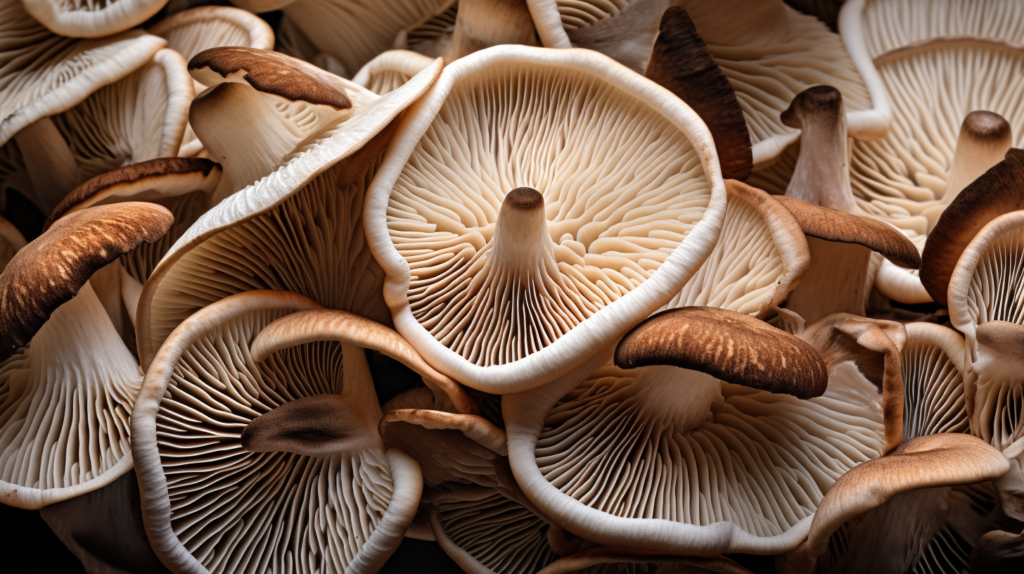For centuries, mushrooms have been used for their therapeutic properties in Asian medicine. However, the Western world is now recognizing the significant health benefits of mushrooms. These fungi are packed with nutrients and bioactive compounds that can enhance immunity, promote cardiovascular health, aid in weight management and even prevent cancer.
One of the standout benefits of mushrooms is their ability to boost the immune system. Studies show that certain types of mushrooms can stimulate the production of immune cells and enhance their activity. In addition, mushrooms have anti-inflammatory properties, which can reduce inflammation in the body and promote overall health.
Furthermore, mushrooms have shown potential in fighting cancer cells and reducing tumor growth. These fungi contain compounds that can inhibit the growth of cancer cells and boost the immune system’s ability to recognize and destroy them.
Beyond their immune-boosting and anticancer properties, mushrooms have numerous other health benefits. They can aid in weight management, improve heart health, and support digestive health.
Key Takeaways:
- Mushrooms are packed with nutrients and bioactive compounds that offer numerous health benefits.
- Specific mushrooms have been shown to boost the immune system and fight cancer cells.
- Consuming mushrooms can improve heart health, aid in weight management and promote digestive health.

Mushrooms for Immune Support
When it comes to boosting the immune system, mushrooms are a valuable ally. Certain varieties of mushrooms have been found to possess unique compounds that can enhance the immune response and protect against infection. Let’s take a closer look at some of the most potent mushrooms for immune support.
Shiitake Mushroom
Shiitake mushrooms are an excellent source of beta-glucans, which are complex sugars that stimulate the immune system. These compounds have been shown to increase the production of white blood cells, which are responsible for fighting off infections and disease. Shiitake mushrooms also contain compounds called eritadenine and lentinan, which have been found to have potent anticancer properties.
Maitake Mushroom
Maitake mushrooms, also known as hen-of-the-woods mushrooms, contain beta-glucans that can activate the immune system and bolster its ability to fight off infections. They also contain compounds that have been shown to reduce inflammation and inhibit the growth of cancer cells.
Reishi Mushroom
Reishi mushrooms are packed with polysaccharides, triterpenes, and other compounds that can enhance the immune response. They have been found to stimulate the production of natural killer cells, which are specialized immune cells that can recognize and destroy cancer cells. Reishi mushrooms also contain compounds that can reduce inflammation and protect against oxidative stress.
These and other mushrooms have a wealth of properties that can support overall health and wellbeing. Incorporating them into your diet is a delicious and easy way to give your immune system a boost.

Mushrooms for Heart Health
Research has shown that incorporating certain types of mushrooms into your diet can significantly improve heart health. Mushrooms are low in fat and calories, making them an ideal food to include in a heart-healthy diet.
One way mushrooms can contribute to heart health is through their ability to help lower cholesterol levels. The beta-glucans found in mushrooms have been shown to have cholesterol-lowering effects. In fact, studies have found that eating just one to two servings of shiitake mushrooms per day can lead to significant reductions in total and LDL cholesterol levels.
In addition to their cholesterol-lowering effects, mushrooms may also help reduce blood pressure, another key factor in heart health. This is due to their high content of potassium, a mineral that helps regulate blood pressure levels.
Furthermore, mushrooms have been found to have anti-inflammatory properties that can benefit the heart. Chronic inflammation is a risk factor for many heart conditions, and the anti-inflammatory compounds found in mushrooms may help reduce this risk.
Overall, adding mushrooms to your diet can be a simple yet effective way to improve heart health and reduce the risk of heart disease.

Mushrooms for Brain Health
Mushrooms not only have the potential to enhance your physical health, but they may also boost cognitive function. Some studies suggest that regular consumption of certain mushrooms may help prevent age-related cognitive decline and improve memory and focus.
One of the reasons mushrooms may support brain health is their high antioxidant content. Antioxidants help protect against oxidative stress, which can damage brain cells and contribute to cognitive decline.
Another potential benefit of mushrooms for brain health is their high levels of ergothioneine, a unique antioxidant that may help protect against neurodegenerative diseases such as Alzheimer’s and Parkinson’s.
Research has also shown that certain compounds found in mushrooms, such as polysaccharides and beta-glucans, may have a positive impact on immune function and inflammation in the body, which can indirectly benefit brain health.
While more research is needed to fully understand the relationship between mushrooms and brain health, adding them to your diet is a simple and delicious way to potentially support optimal cognitive function.

Mushrooms for Weight Management
Mushrooms can be a valuable addition to any weight management plan due to their low-calorie content and high fiber content. One cup of sliced mushrooms contains only 15 calories, making them an excellent food choice for those looking to reduce their calorie intake.
The fiber in mushrooms can also help promote feelings of fullness and satiety, which can lead to a reduction in overall calorie intake. Additionally, mushrooms can be used as a healthy substitute for higher-calorie foods like meat or cheese in dishes such as burgers and pizza.
One study found that substituting mushrooms for meat in a meal once a day led to significant weight loss over a year-long period. The participants in the study were able to reduce their daily caloric intake while still feeling full and satisfied after meals.
Overall, incorporating mushrooms into your diet can be a simple and effective way to support weight management goals while still enjoying delicious and satisfying meals.

Mushrooms for Cancer Prevention
Mushrooms have gained significant attention for their potential to prevent and fight cancer.
Research has shown that certain mushrooms, such as shiitake, maitake, and reishi mushrooms, contain compounds that can inhibit tumor growth and stimulate the immune system’s ability to recognize and destroy cancer cells.
One of these compounds is beta-glucans, which can help activate white blood cells to attack cancer cells. In addition, mushrooms contain polysaccharides, which have been shown to have antitumor effects.
Another compound found in mushrooms is ergothioneine, which has been linked to a reduced risk of cancer and other chronic diseases.
While more research is needed to fully understand the anticancer properties of mushrooms, incorporating them into a healthy diet may offer potential benefits for cancer prevention and overall health.

Mushrooms for Digestive Health
Mushrooms are not just a tasty addition to meals; they offer several health benefits, including supporting a healthy digestive system. Mushrooms are rich in fiber, which can aid in digestion and promote regular bowel movements, helping to prevent constipation.
Beyond their high fiber content, mushrooms also have prebiotic properties, meaning they can help promote the growth of healthy gut bacteria. A healthy gut microbiome is beneficial for overall digestive and immune health.
Mushrooms for Nutritional Value
Mushrooms are not only delicious but also highly nutritious. They are a low-calorie food that is rich in vitamins, minerals, and antioxidants. Mushrooms are high in the B vitamins riboflavin, niacin, and pantothenic acid, which play a crucial role in energy metabolism. Mushrooms also contain essential minerals such as selenium, copper, and potassium.
Additionally, mushrooms are an excellent source of dietary fiber, which helps to maintain a healthy digestive system. They are also low in fats and calories, making them an ideal food for those watching their weight.
Mushrooms are also considered to be a source of plant-based protein. While the protein content may vary between mushroom types, some mushrooms such as shiitake mushrooms contain all nine essential amino acids.

Mushrooms: A Nutritional Powerhouse
Overall, mushrooms are a highly nutritious food that can provide a wide range of health benefits. They are low in calories and fat, making them an excellent option for those looking to manage their weight. Additionally, mushrooms are a good source of vitamins and minerals, including:
- Vitamin D
- B vitamins, including riboflavin, niacin, and pantothenic acid
- Copper, which is important for maintaining healthy bones and red blood cells
- Potassium, which can help regulate blood pressure
- Selenium, an antioxidant with potential anti-cancer properties
Mushrooms are also a source of dietary fiber, which can help promote digestive health and prevent constipation. In fact, one cup of sliced mushrooms contains about 1 gram of fiber.
Choosing and Preparing Mushrooms
When selecting mushrooms, look for those that are firm and free of bruises or blemishes. They should also have a slightly sweet, earthy aroma. Some popular mushroom varieties include:
- Button mushrooms
- Shiitake mushrooms
- Portobello mushrooms
- Maitake mushrooms
- Oyster mushrooms
To prepare mushrooms, gently wipe them clean with a damp cloth or paper towel. Avoid washing them with water, as they can become waterlogged and lose their flavor. Mushrooms can be eaten raw in salads or cooked in a variety of dishes.
Overall, mushrooms are a versatile and nutritious addition to any diet. By incorporating them into your meals, you can reap their many health benefits.

FAQ
Q: What are the health benefits of mushrooms?
A: Mushrooms have numerous health benefits, including boosting immunity, fighting cancer growth, promoting heart health, enhancing brain function, aiding in weight management, preventing cancer, and supporting digestive health.
Q: Which mushrooms are known for their immune-boosting properties?
A: Shiitake, maitake, and reishi mushrooms are well-known for their immune-boosting properties. They can help enhance the immune system and support overall health.
Q: How do mushrooms contribute to heart health?
A: Mushrooms can improve cholesterol levels, lower blood pressure, and reduce the risk of heart disease. They contain compounds that are beneficial for cardiovascular health.
Q: Can mushrooms enhance brain health?
A: Yes, mushrooms have been found to have cognitive benefits. They can enhance memory, focus, and overall brain function.
Q: Are mushrooms helpful for weight management?
A: Mushrooms can aid in weight management due to their low-calorie content, high fiber content, and potential to promote satiety. They can be a healthy substitute for higher-calorie foods.
Q: Do mushrooms have any potential in cancer prevention?
A: Yes, certain mushrooms have shown potential in fighting cancer cells and reducing tumor growth. They can also boost the immune system’s ability to recognize and destroy cancer cells.
Q: How can mushrooms contribute to digestive health?
A: Mushrooms are high in fiber, which aids in digestion and prevents constipation. They also have prebiotic properties and support a healthy gut microbiome.
Q: What is the nutritional value of mushrooms?
A: Mushrooms are rich in vitamins and minerals, low in calories and fat, and can serve as a source of plant-based protein.














